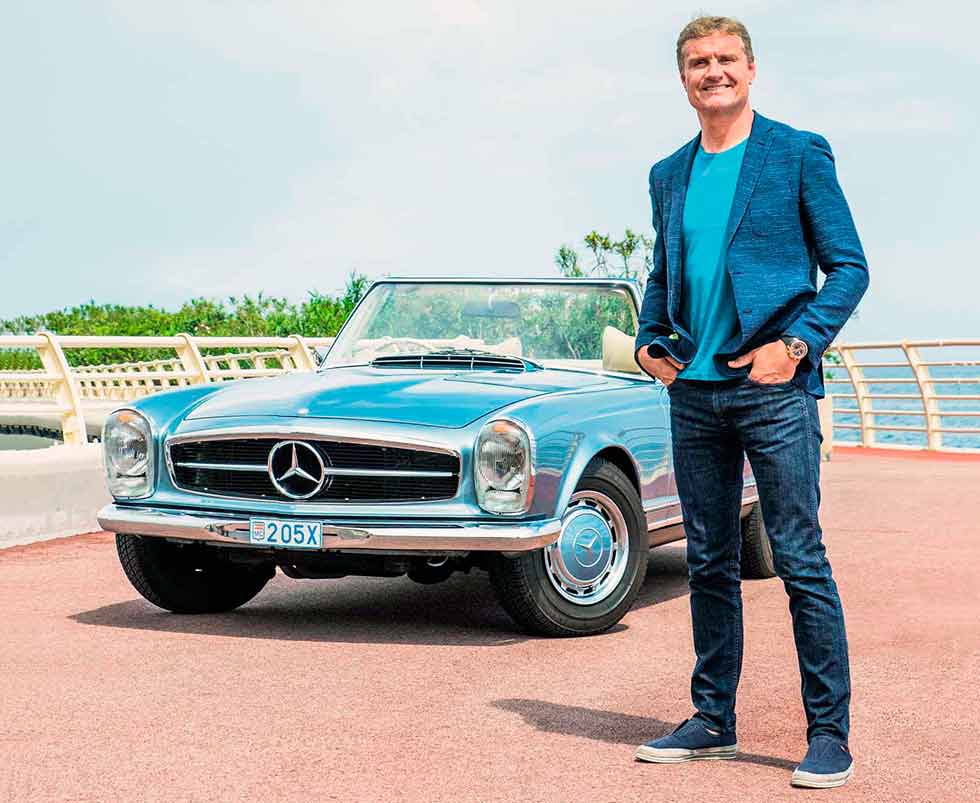David Coulthard Interview. Multiple grand prix winner, TV personality and entrepreneur, Coulthard has literally written the book on success in a life that always revolved around cars. Words Damien Smith. Portrait photograph Jayson Fong Archive Alamy.
THE DRIVE-MY INTERVIEW David Coulthard, F1’s Mr Nice Guy / Damien Smith – ‘David Coulthard is modest about his abilities and achievements, yet he beat Michael Schumacher and Mika Hakkinen – the best of a golden generation in F1. He also managed to race with grace and humour. One of the good guys of grand prix racing.’ Damien interviewed DC for Drive-My.
‘Valtteri. Valtteri! Valtteri!’ David Coulthard breaks off from his story to hail a passing Mercedes Formula 1 star, who has just jogged by his street-side vantage point. Such is life in Monaco – although Alan Partridge’s ‘Dan!’ moment in a Norfolk hotel car park springs more to mind. ‘He’s got his headphones on, lost in his thoughts,’ says David, having given up trying to flag down Mr Bottas. ‘I’ll be honest with you – I don’t want this to sound disrespectful, but it’s a very effeminate run…’

A quip and a chuckle are never far away during conversation with Coulthard, especially in his post-F1 retirement spec. He’s 47, ten years since he stepped away from the grand prix cockpit for a civilian life that’s rarely sedate. DC, as he’s universally known, still strides the paddocks as a pundit for Channel 4 and, like his old friend and former manager Martin Brundle, is as famous now as he ever was. Perhaps more.
But there’s much more to DC than punditry, which is why he’s talking to Drive-My. In our conversation, he talks about the cars that mean most to him – and how his modest collection is about to expand in just about the most immodest way possible. He also reminds us obliquely why he is so respected and liked, despite (or more accurately because of) a blunt honesty about his own capabilities rare among his ego-driven breed.
Coulthard is in a good place right now, and we don’t just mean Monaco. The media career is blossoming, behind the camera as much as in front of it, thanks to his share in the company that produces Channel 4’s F1 shows, Whisper. It is, he says, now the third biggest of its kind in the UK (he turned down the Chris Evans Top Gear reboot to help found it – sensible chap), and it’s given the 13-time grand prix winner a stronger taste for business life. So much so, he’s written a book about it.
The Winning Formula carries the sub-title ‘Leadership, Strategy and Motivation the F1 Way’, which gives some clue to its nature. A high-octane feast of fast cars and faster women this ain’t. Instead, it’s a highly personal philosophy of professional life from a decent man who believes the simple hardgraft work ethic that drove him through F1 for the best part of two decades directly translates to the business world. In essence, it’s a motivational self-help book for business-minded people seeking a spot of inspiration.
Dry? It would be. But David’s engaging style and allusions to his rich F1 life (in every sense) kept us turning the pages. And most pertinently for us, the book also offers insight into the brittle psyche of a brilliant and brave racing driver who, from the beginning, was almost painfully aware of his own limitations. It’s that embedded insecurity, and Coulthard’s willingness to express it, that make him so fascinating. As a friend and colleague used to say regularly: ‘If only he’d been three-tenths quicker.’
Forget all the Monaco trappings: there’s something that’s refreshingly genuine about Coulthard. The son of a successful road haulage operator from Twynholm in southwest Scotland, DC shone through teenage karting and junior single-seaters before landing an F1 testing role with Williams (when they were mighty) in 1993. The following year he made his grand prix debut in the most trying of circumstances: as a replacement for perhaps the greatest driver in history, following Ayrton Senna’s death at Imola. How he handled that pressure was a testament to both his maturity and promise.
‘MY FATHER TOLD ME TO HAVE A PLAN BEYOND F1 BECAUSE IF I WAS LUCKY I MIGHT GET A TEN-YEAR CAREER. I WAS INCREDIBLY LUCKY AND HAD 15’
Jumping ship to middling McLaren in 1996 seemed a backward step (Damon Hill won the title for Williams that year), but in it was a sound long-term move. He joined at the same time as Adrian Newey, then reaped the benefits as the design genius and the growing force of Mercedes engines shot McLaren back to the top. In nine seasons, DC won both the British and Monaco GPs twice, finished third in the championship three times and was runner-up in the points to Michael Schumacher in 2001.
When McLaren eventually replaced him in ’05, he enjoyed an extended Indian summer at the new Red Bull Racing team, rebranded from what had been Jaguar. Over the next four seasons, though maybe he was past his prime, DC contributed significantly to the growth of a team – again in partnership with Newey – that would eventually win four consecutive titles with Sebastian Vettel in 2010-13. He retired from F1 with dignity, and a healthy bank balance, at the end of ’08. Cars and motor racing have always been a part of his life. He’s no encyclopaedia, but DC is adamant that the context of his sport was ingrained early on.
‘I was always into it,’ he says. ‘Growing up before the days of four channels, never mind satellite TV, my father had our games room library full of books on motor racing and the war. My father is dyslexic so those shelves were never going to be filled with novels. He was Scottish karting champion, but his father died when he was 14 and he had to stop.’
In the book, he writes at length about the guiding influence of his parents and compares the F1 driver’s career to the life of a mayfly… ‘Part of that came from my grounded parents,’ he says. ‘My father was always saying that when you get to F1, you must have a plan beyond it because if you are lucky you might get a ten-year career. I was incredibly lucky and had 15.’
That grounding even appears to have coloured his choice of indulgences, including the car he posed with for our pictures. He bought the Mercedes-Benz 280SL Pagoda W113 in 1995 when he landed his first big F1 deal. ‘I could have bought a Gullwing for £120k,’ he says. ‘But at the time my Williams contract was half-a-million pounds and I remember thinking that was more than a fifth of my salary, on a car. If I told my mum and dad that, they’d think I’d gone mental.
‘But as soon as I had an above-average salary, I wanted to buy a classic car. I’d always been a big fan of Mercedes and I wanted an old car more than I wanted a sports car. Up until that year I’d never had any money in my bank account. It was what I could afford at the time. I remember driving it to Silverstone and proudly showing it to my parents. It’s a perfect example of a 280SL, first registered in April 1971; I was born in March 1971.
I guess I’m more drawn to classics.’ What he says next blows that clean out of the Monaco harbour water.
‘I’ve got an order on an Aston Martin Valkyrie,’ he drops in, ‘because it will clearly be something special. Am I ever going to exploit that specialness on the road? Of course not. But the reason I can afford one is that I drove most of my career in Adrian Newey cars! So the least I can do is have one, as he’s designed it.
‘I also have an order on a Mercedes-AMG Project One because I’m a Mercedes ambassador and again it’ll be something unique, with its hybrid F1 engine. I’ve placed those orders because I can, and I happen to believe in those two projects. Plus I’m curious. I don’t want to be curious from the spectator stand, I want to be in amongst it: to see if it’s as exciting, fun and emotionally engaging as it is for other people who go in and buy cars.’
Such extravagance is out of character for a man who was never flash. As an F1 superstar at European races, he was happy to stay in his own well-equipped trackside motorhome rather than in plush hotels. Luxuries were a distraction back then.
It’s surprisingly common for young racing drivers – the really good ones – to display a passivity towards road cars because their focus is trained solely on their vocation. ‘I definitely fell into that category,’ says DC. ‘Yes, you can have distractions – toys and boats and cars – but actually if you really care about them you’re probably not 100% focused on what you have to do.’
From his earliest days, Coulthard’s level of commitment was unusual, even in a sphere where it’s taken for granted. He offers an example in the book, from his teenage karting days. Expanding on the story, he offers a glimpse of that in-built self-doubt.
‘My father was clearing out the loft the other day,’ he says, ‘and found my old karting notebooks. I’d grade myself. That was my self-analysis. I don’t think I ever gave myself 10 out of 10: sometimes four or five, sometimes one… Maybe I was more self-aware, that I had to work harder than others who had more natural talent.’
Coulthard says he doesn’t remember a specific time when it dawned on him that he’d never be the best, but in F1 he was understandably sensitive to any suggestion that he didn’t quite ‘have it’. All those years racing in the same team as double-champion Mika Häkkinen and taking on the great Michael Schumacher must have taken its toll. ‘I do it now, I make snap judgements based on drivers’ performance because that’s what we have to do,’ he says. ‘We do every commentary based on potential.
Everybody has got potential. We’ve got to say: ‘It looks to me that this driver is more complete than this one.’ That’s always going to upset the guy who is not quite as complete, and it probably upset me.’
Coulthard rationalised his place in F1 years ago. ‘What you have in sport is the underlying confidence and commitment, irrespective of whether you are modest or brash, that you are focused on always improving,’ he says. ‘That’s what always drove me forward. Some are quick in anything; others, like myself, need a specific feeling from the car to give me the confidence. In those moments I think I was as good as anyone else.’ He was. On his day, he would beat Häkkinen and Schumacher on merit.
‘But clearly the exceptional drivers are able to deliver that week in, week out. They don’t really have many off-days. Michael didn’t, that’s for sure. Although he had a few when you’d say “What the f**k were you thinking? There’s the rule book. What you have just done is rip it up and apply your own sporting code that we don’t think is very sporting…” That will always taint his great achievements, but it got him to where he was.’
Coulthard was never – could never have been – so ruthless. He recalls his favourite F1 car, the Williams FW17 and evolved 17B of ’1995, and even here his self-analysis is critical. ‘Wide track, slick tyres, Renault V10 – and it was responsive,’ he smiles. ‘I had four pole positions in a row [Monza, Estoril, Nürburgring and Aida] and I was not known for my qualifying.
‘The car felt like a grand prix car. Later, on the grooved tyres at McLaren, we often had the quickest car out there, but it always had quite a bit of understeer. OK, you could do the lap time but it was just a bit f**king annoying, if you are looking for perfection. And I think I always was. Maybe striving for perfection was a negative. Maybe the guys who were more complete would say “That’s what I have, I’m just going to drive around it,” whereas I would say “That’s what I want, and it’s not giving me what I want.” There’s that self-analysis. Perhaps I didn’t cotton on to it early enough. There you go.’
Still, once a racing driver… And some elements of his bullish F1 persona really haven’t changed. ‘I’ve lived in Monaco for 20 years and don’t speak French, but it doesn’t interest me because it doesn’t enhance my business and it doesn’t make me quicker,’ he states, bluntly. That focus, that drive to be ‘the best version of yourself’ as he puts it, is still pushing him in his post-racing life as a budding (and already markedly successful) entrepreneur.
But ambition doesn’t blind him. That solid Twynholm grounding will never let it. All the hypercars in the world won’t change that.
David Coulthard’s The Winning Formula: Leadership, Strategy and Motivation the F1 Way is published by Blink Publishing at £20, ISBN 9781788700115, and is reviewed in this month’s Books.
‘I’VE LIVED IN MONACO FOR 20 YEARS AND DON’T SPEAK FRENCH, BECAUSE IT DOESN’T ENHANCE MY BUSINESS AND IT DOESN’T MAKE ME QUICKER’
Below and right Preparing for the 2008 Chinese Grand Prix at Shanghai; at Spa, August 2017, with Channel 4 colleague Susie Wolff and her husband, Toto Wolff, of the Mercedes-AMG F1 team.
Right and below Coulthard shares the podium with Michael Schumacher and Gerhard Berger at Hockenheim, 1995; driving his Williams- Renault the same year.





